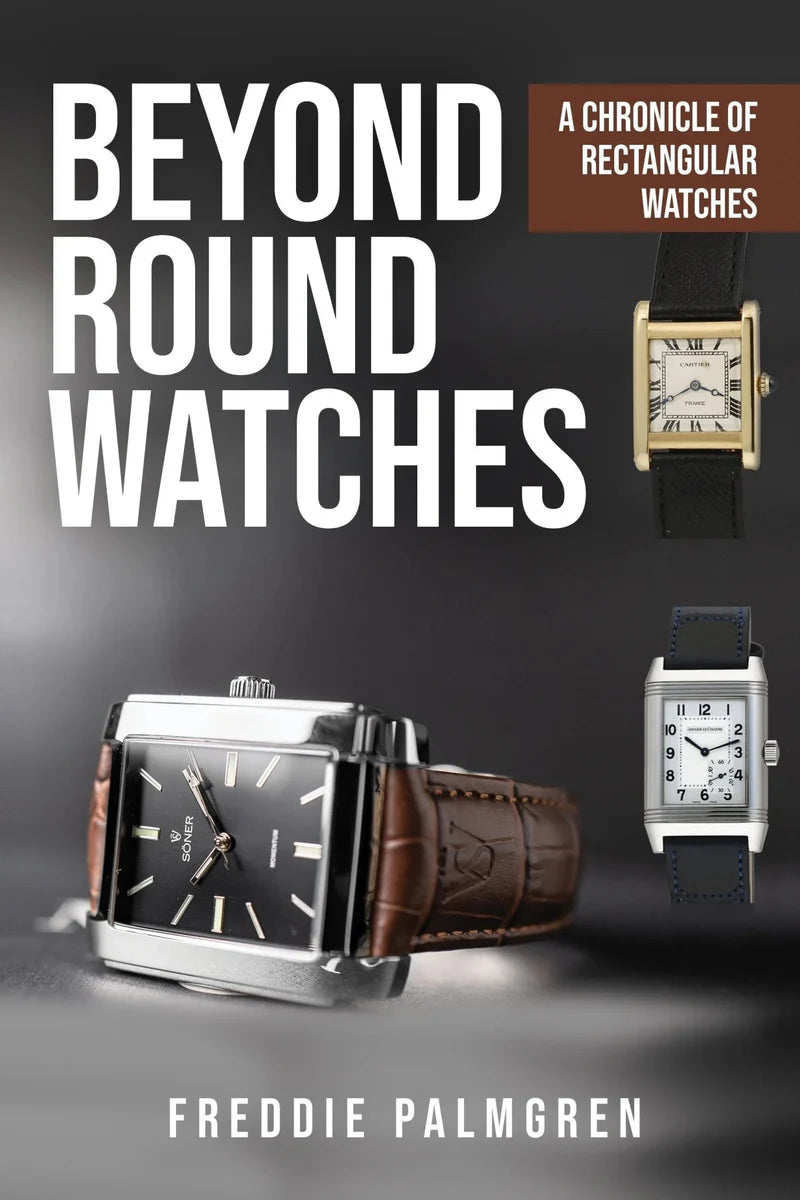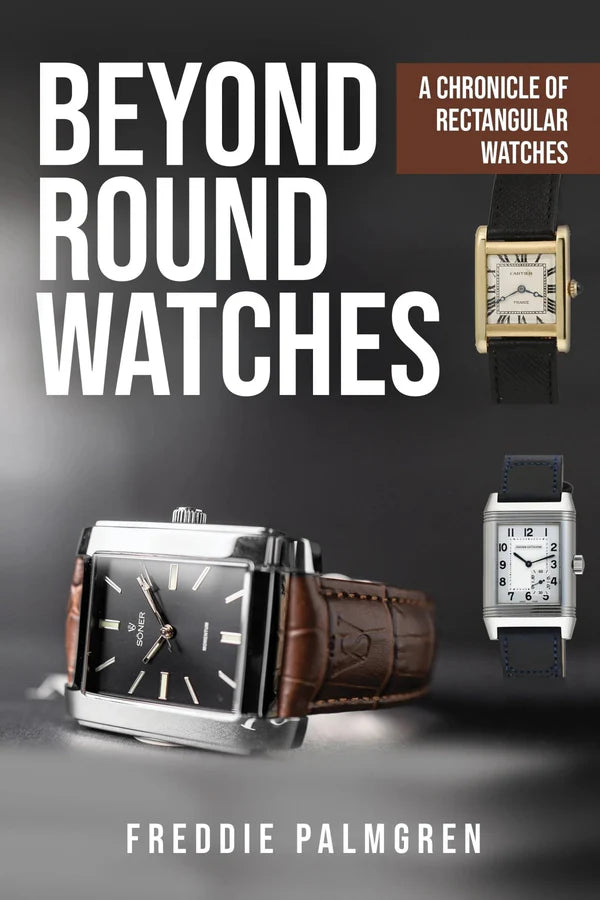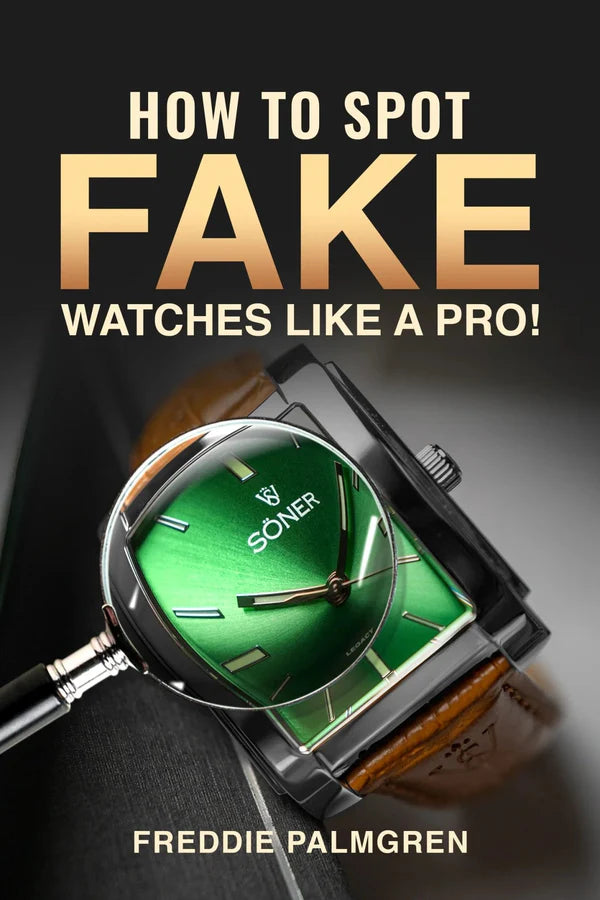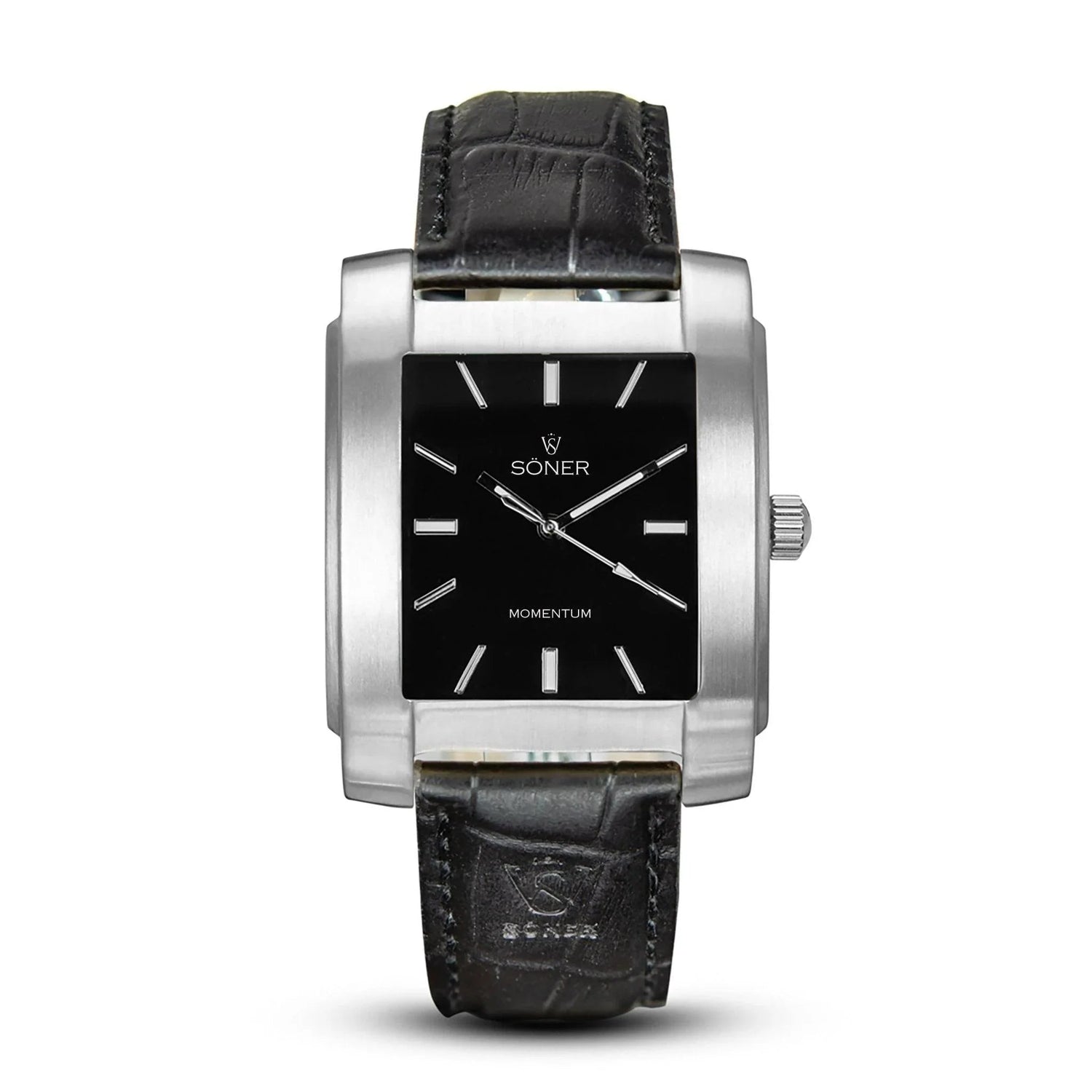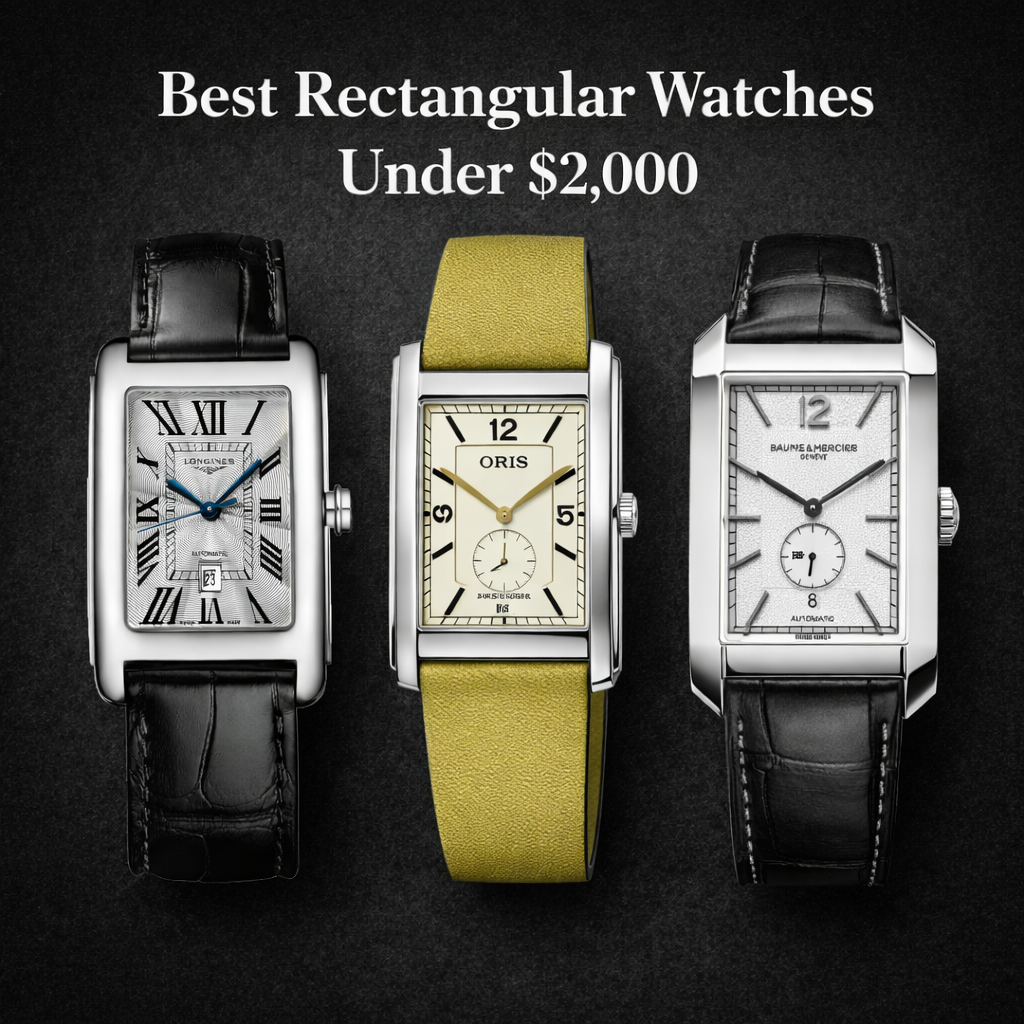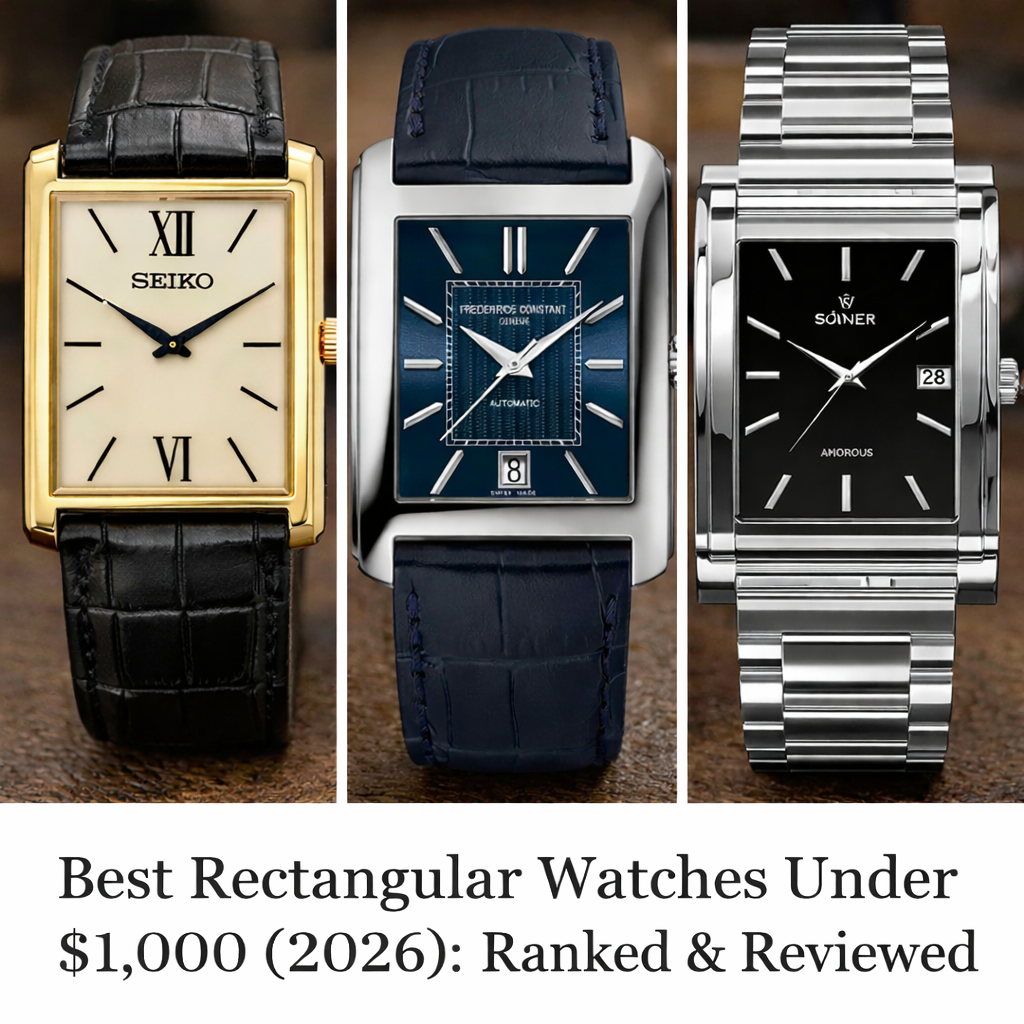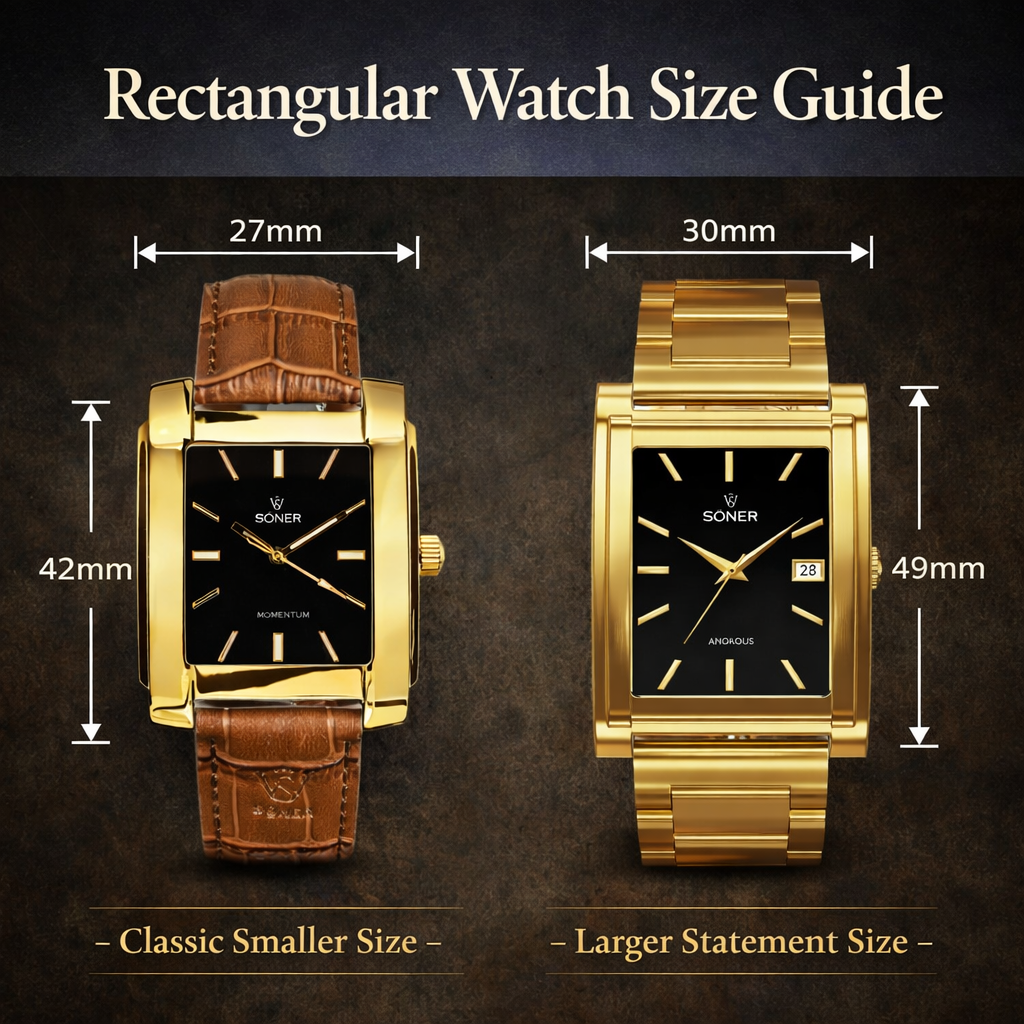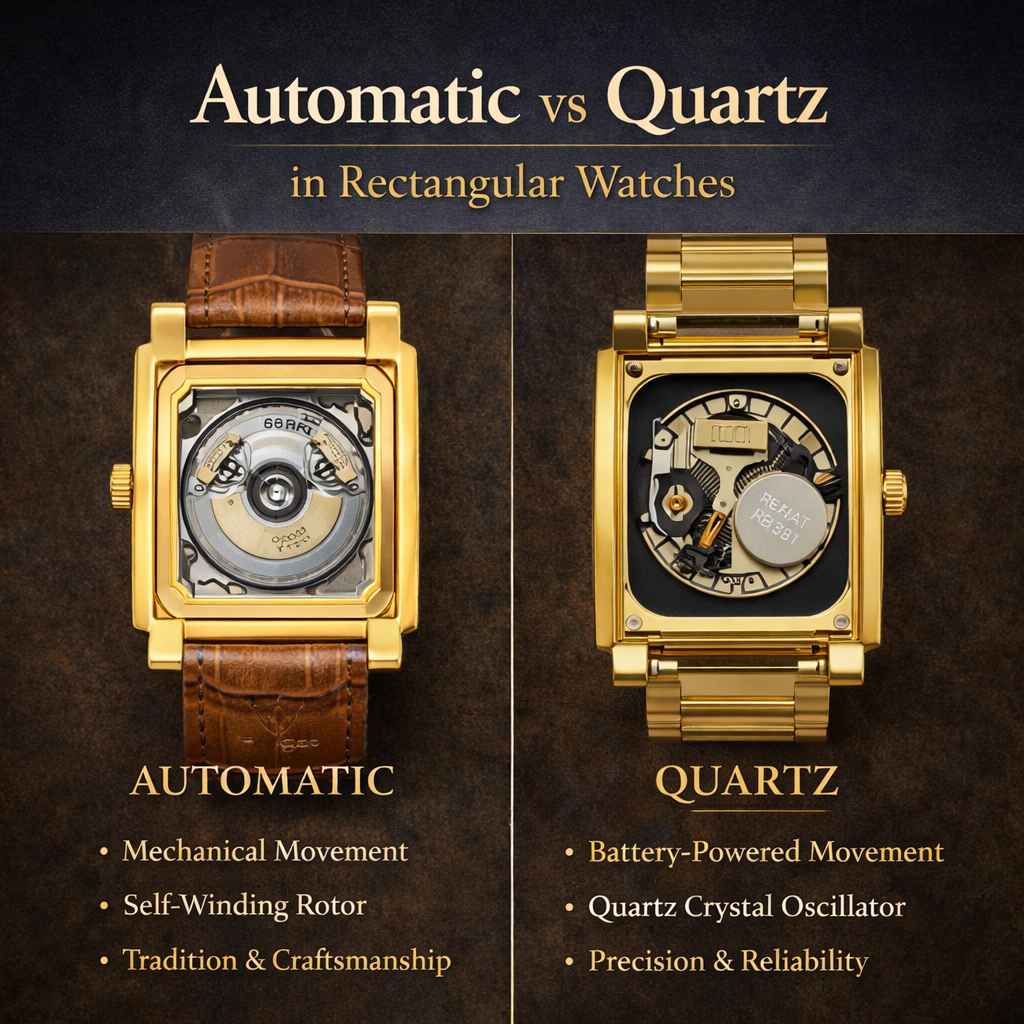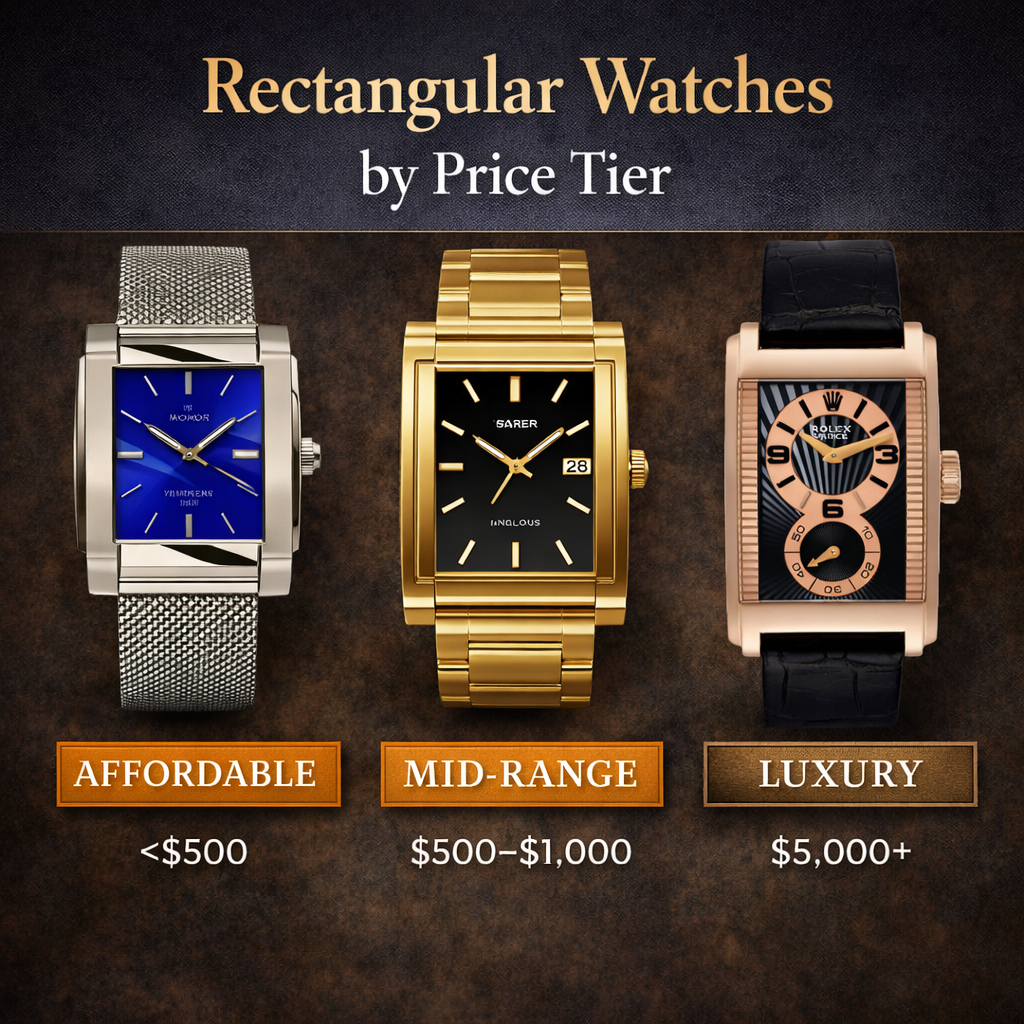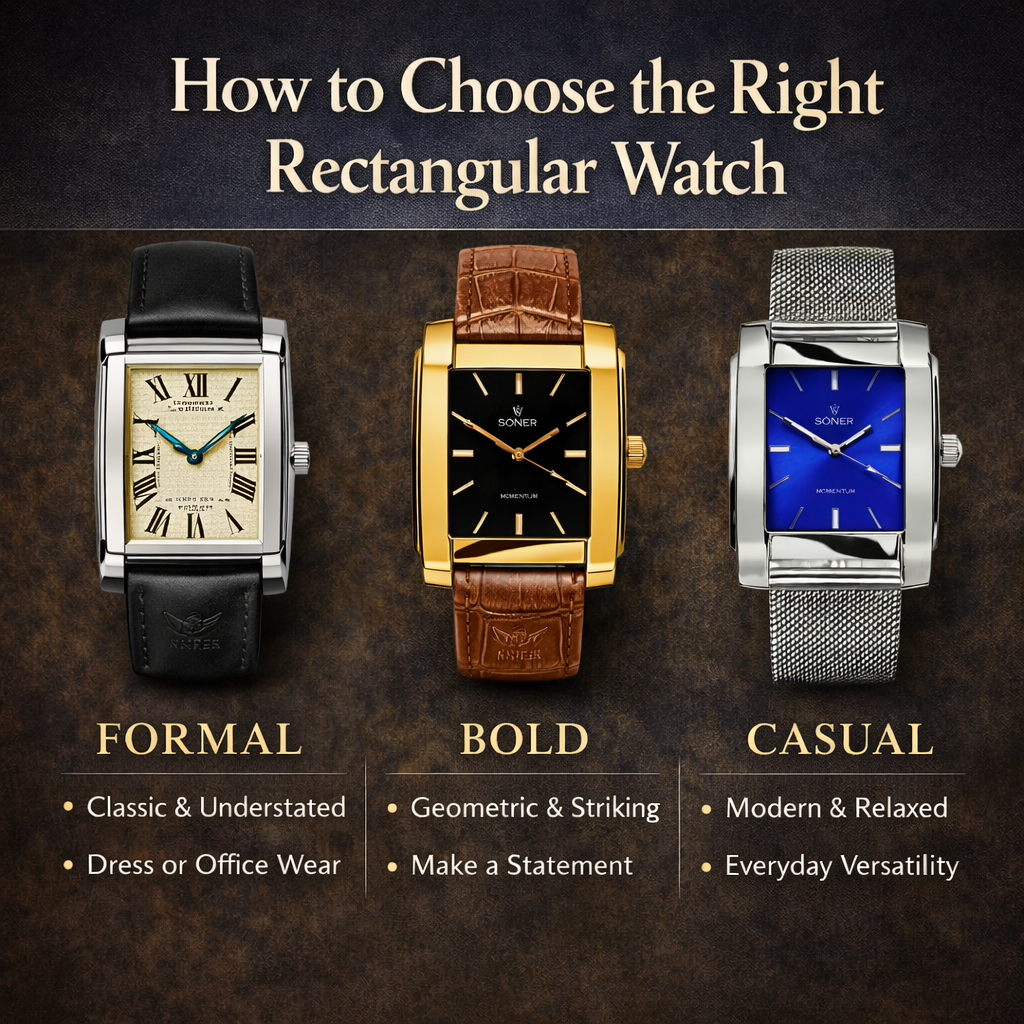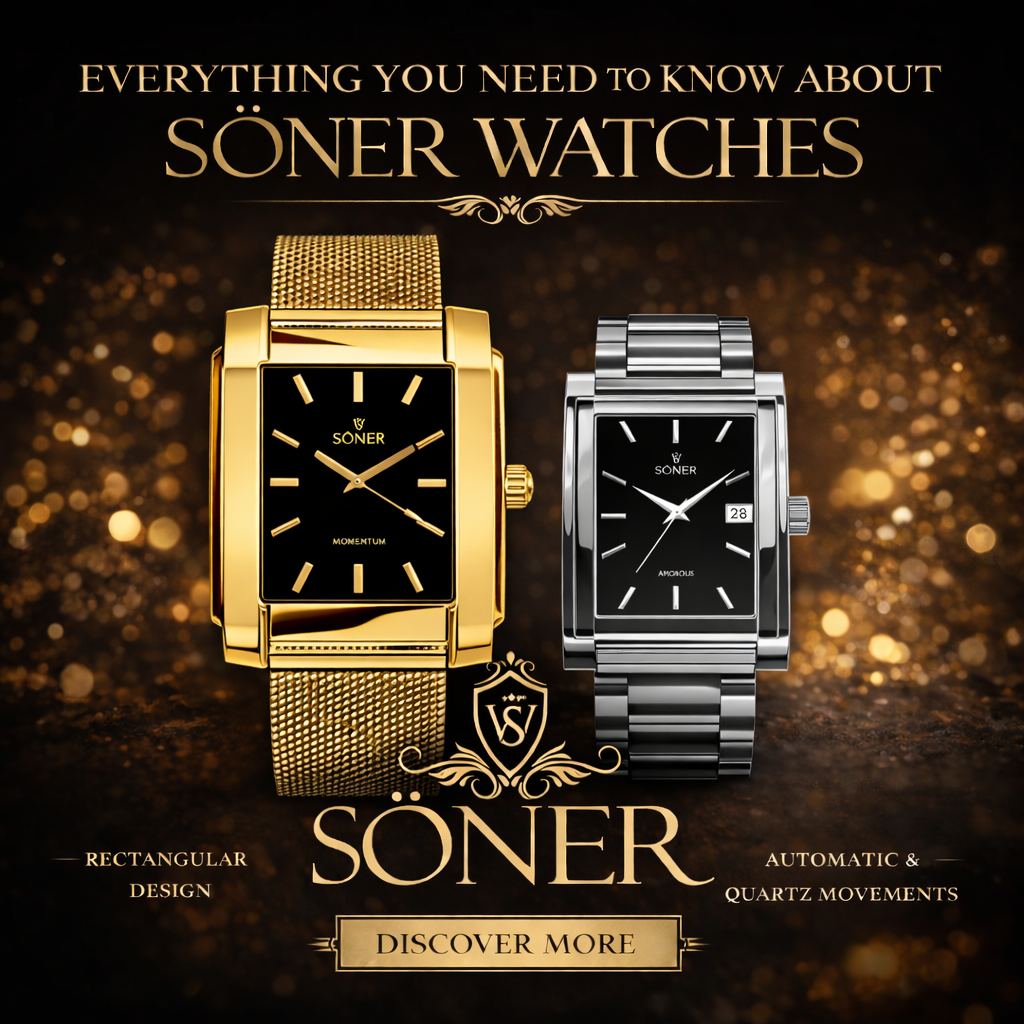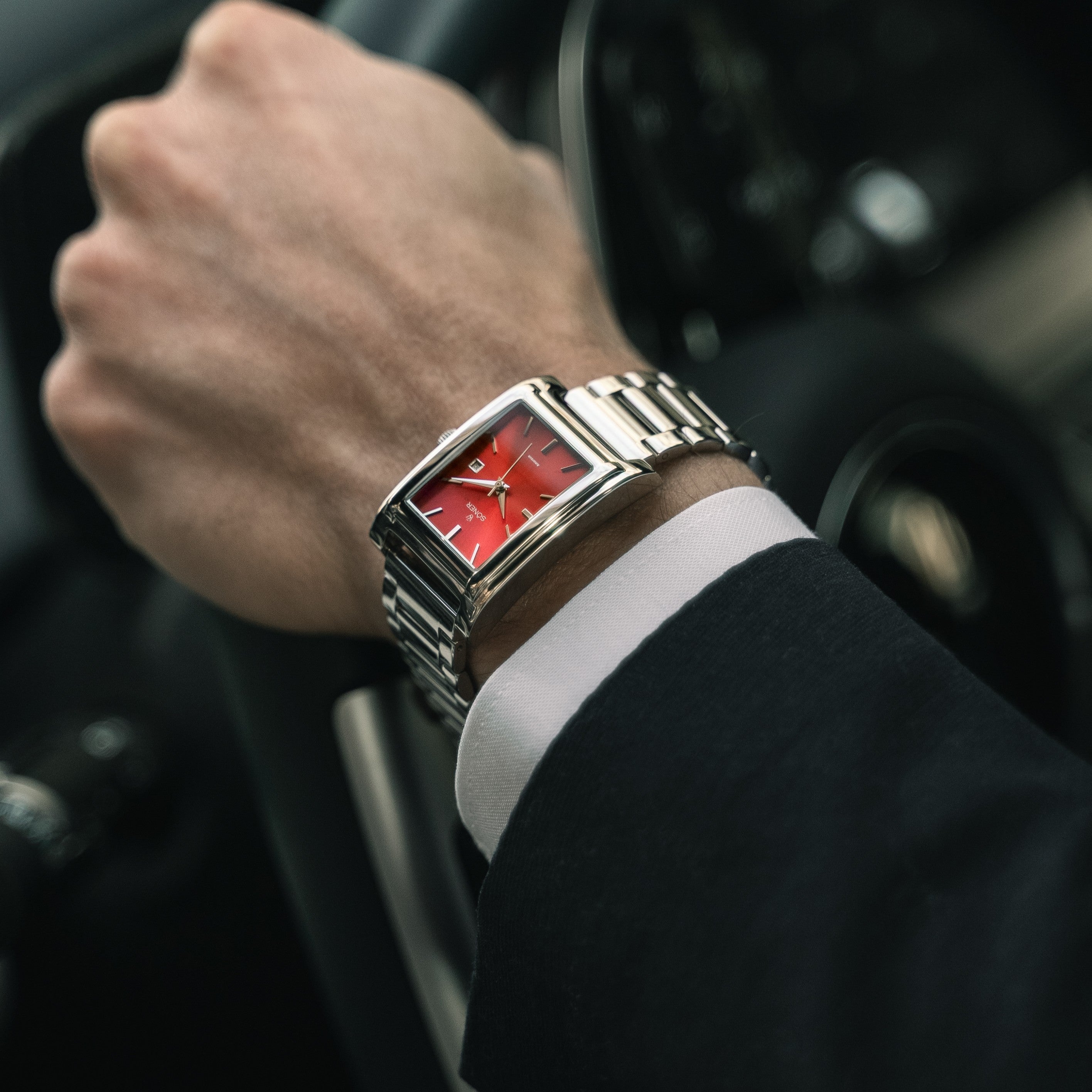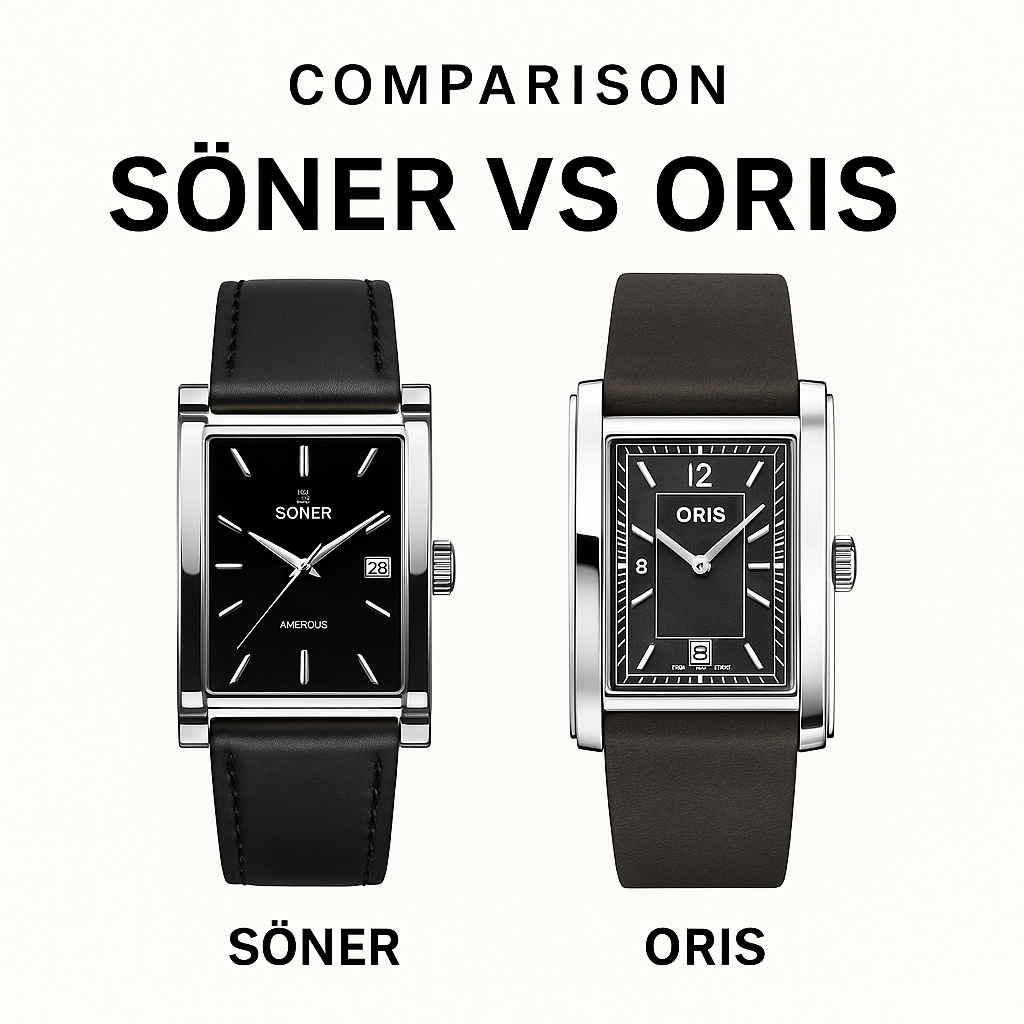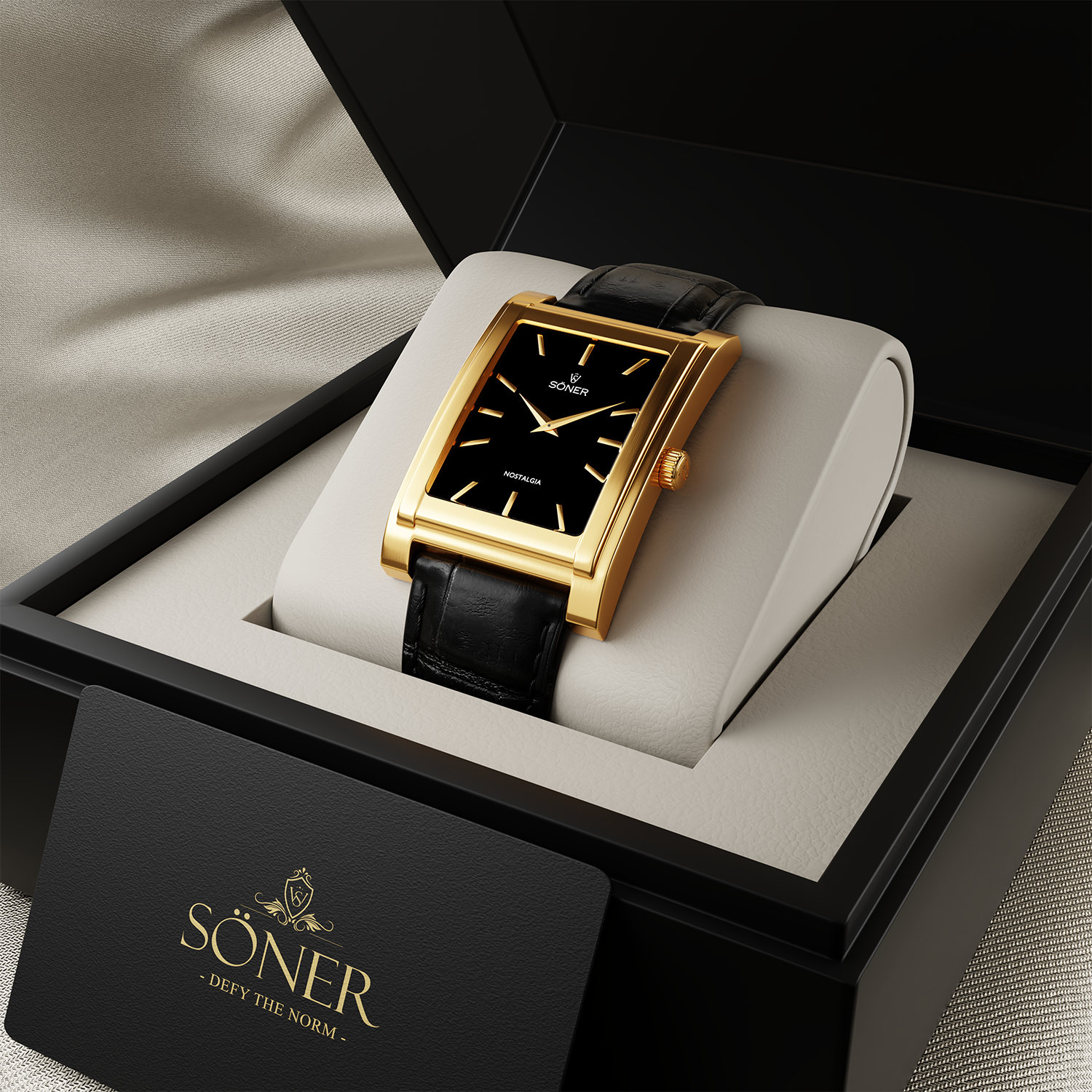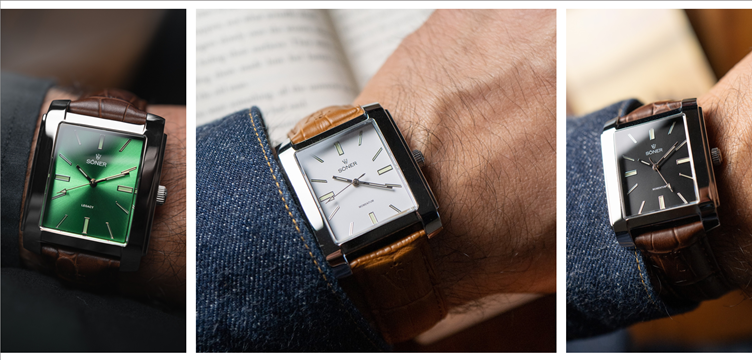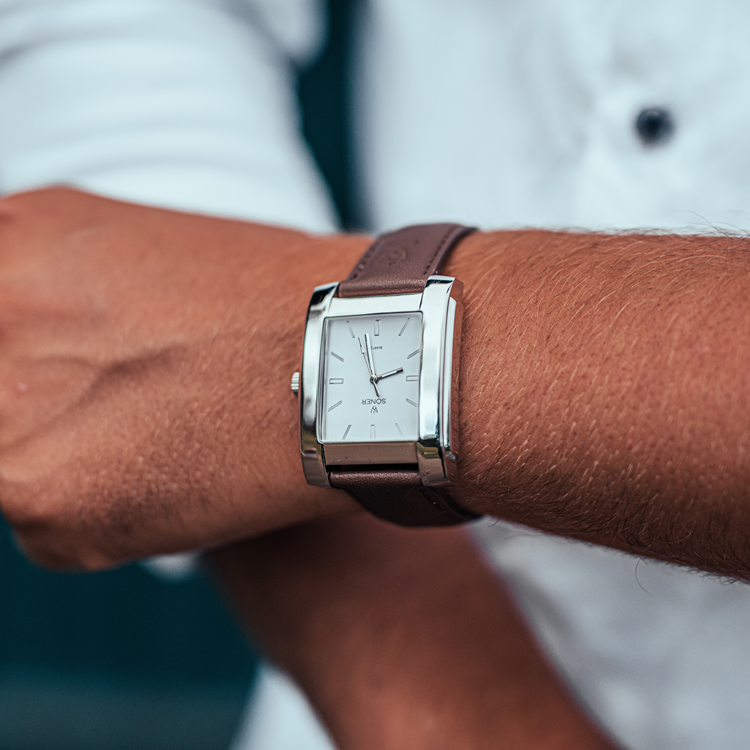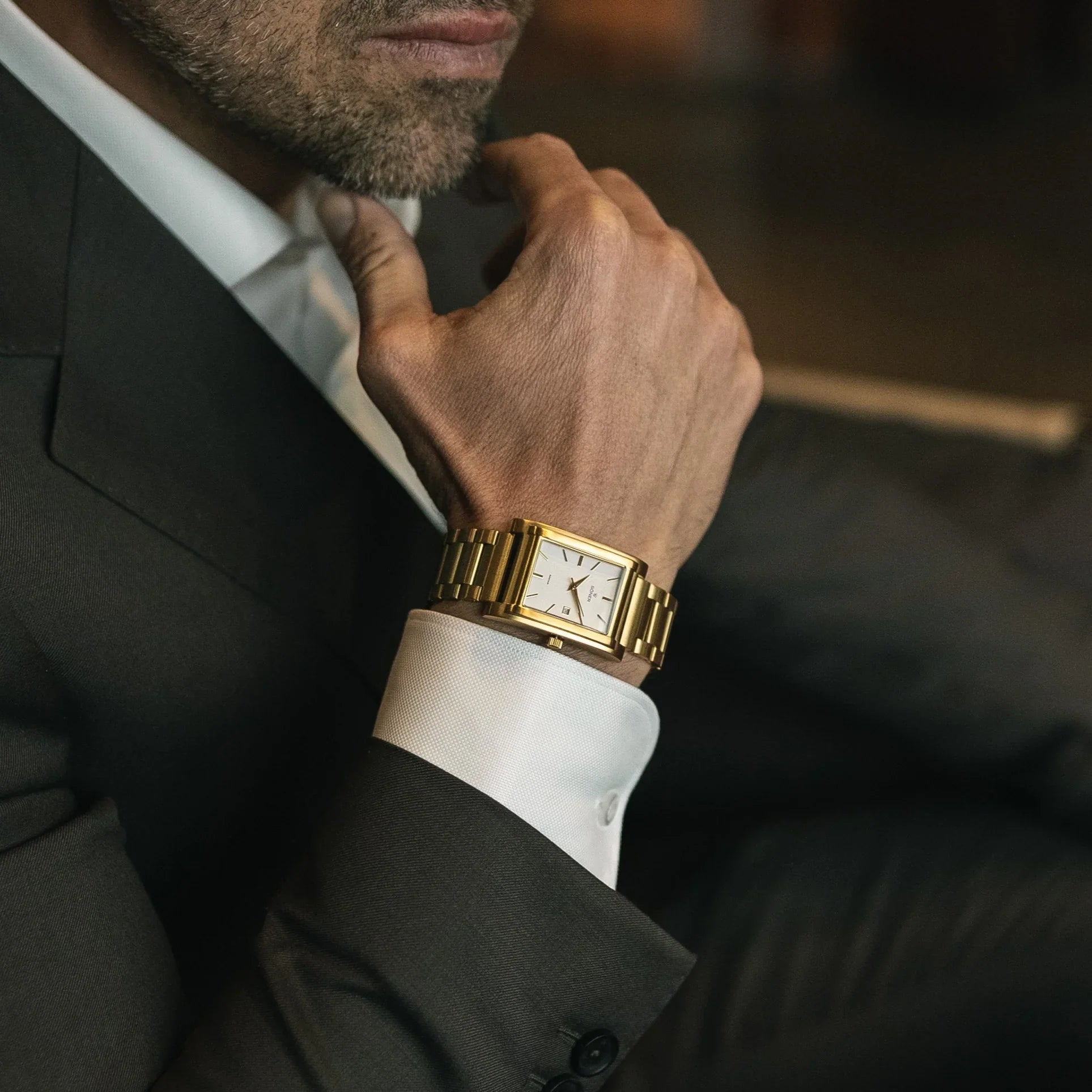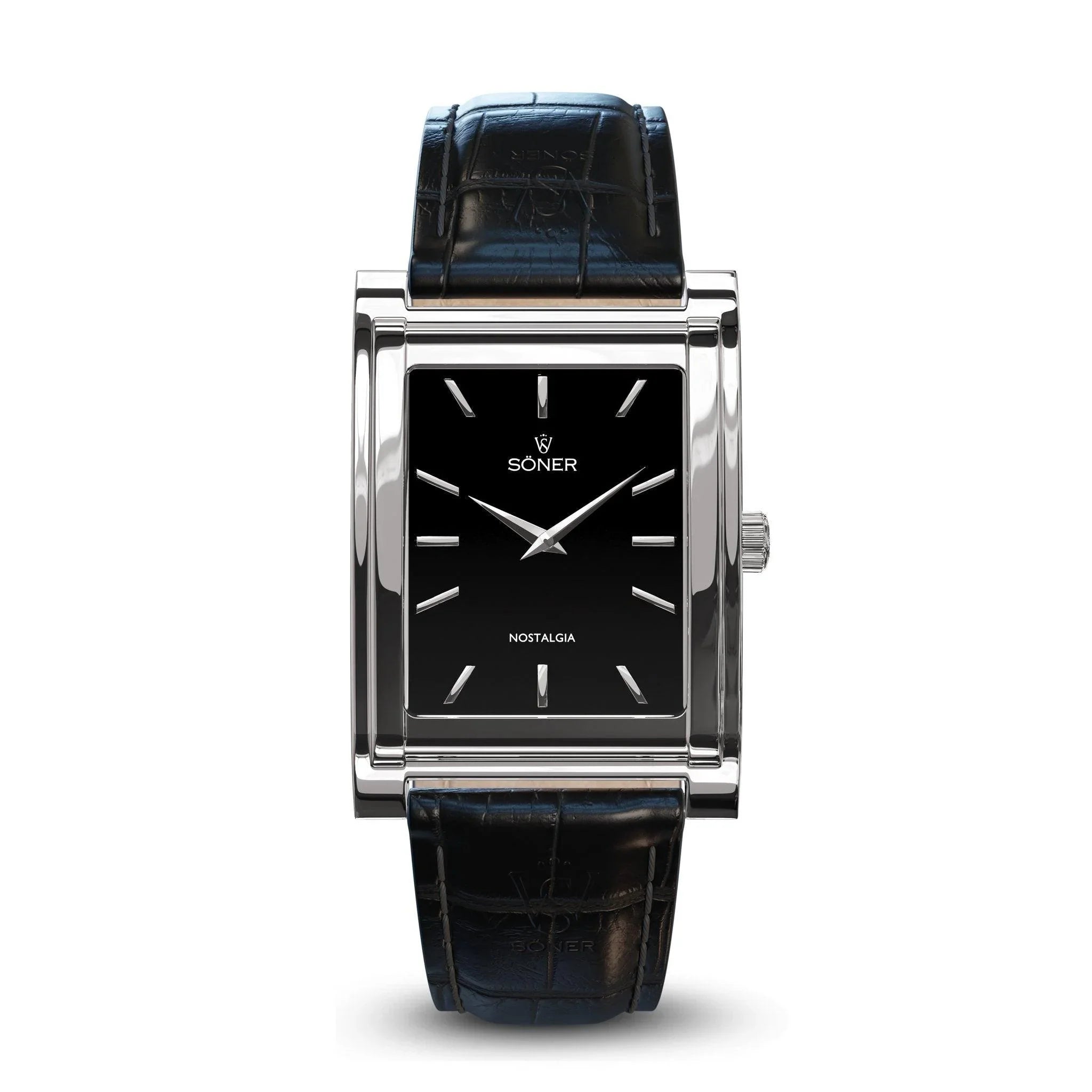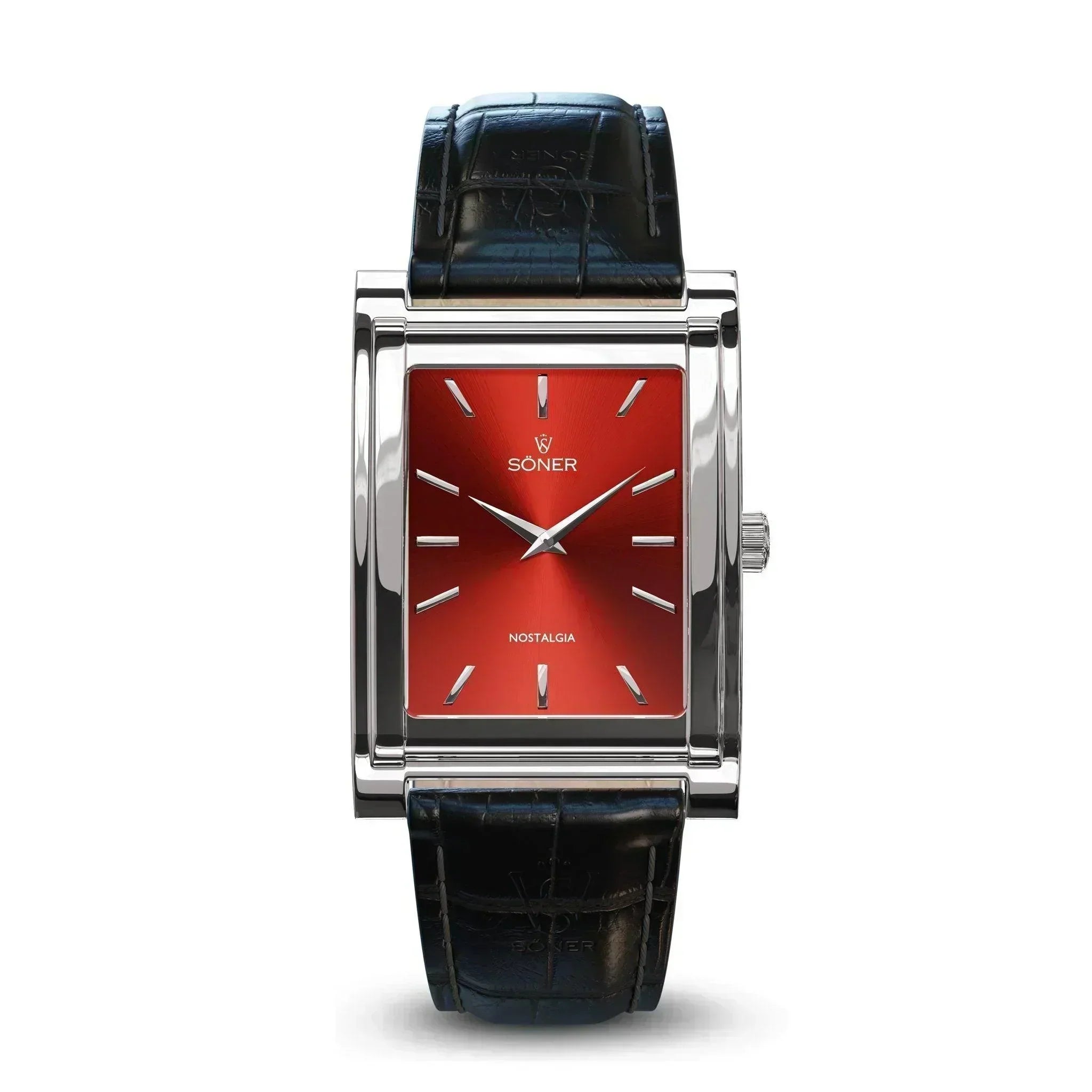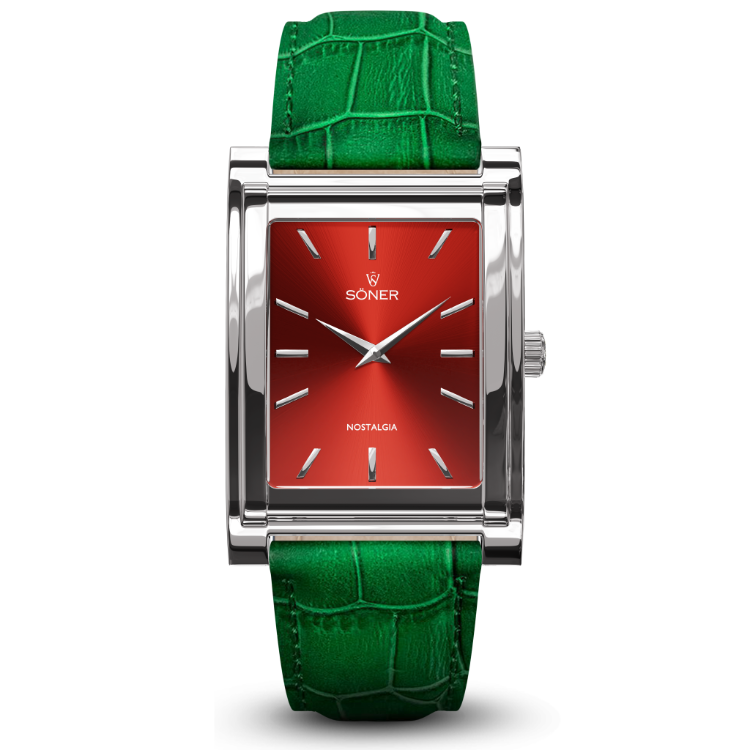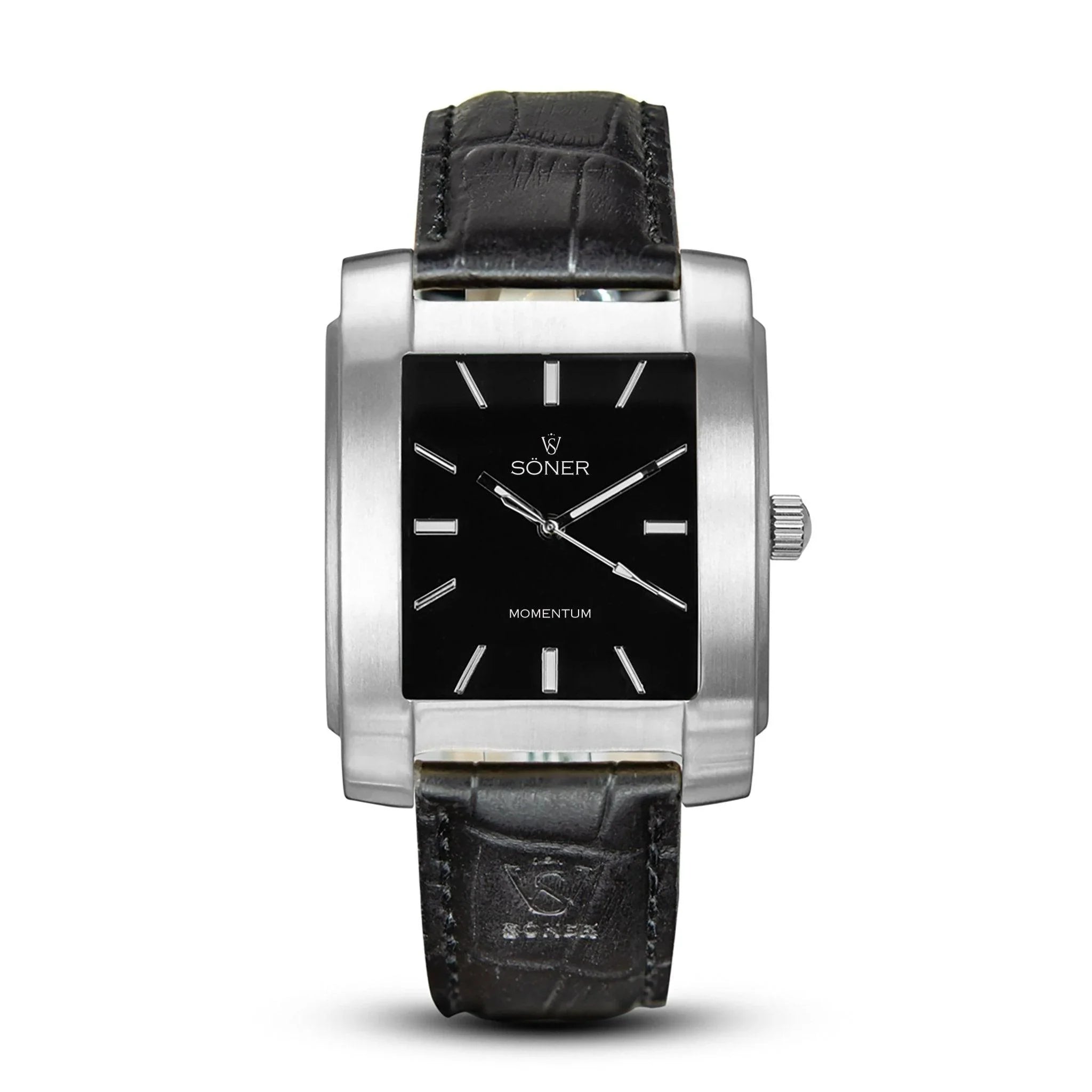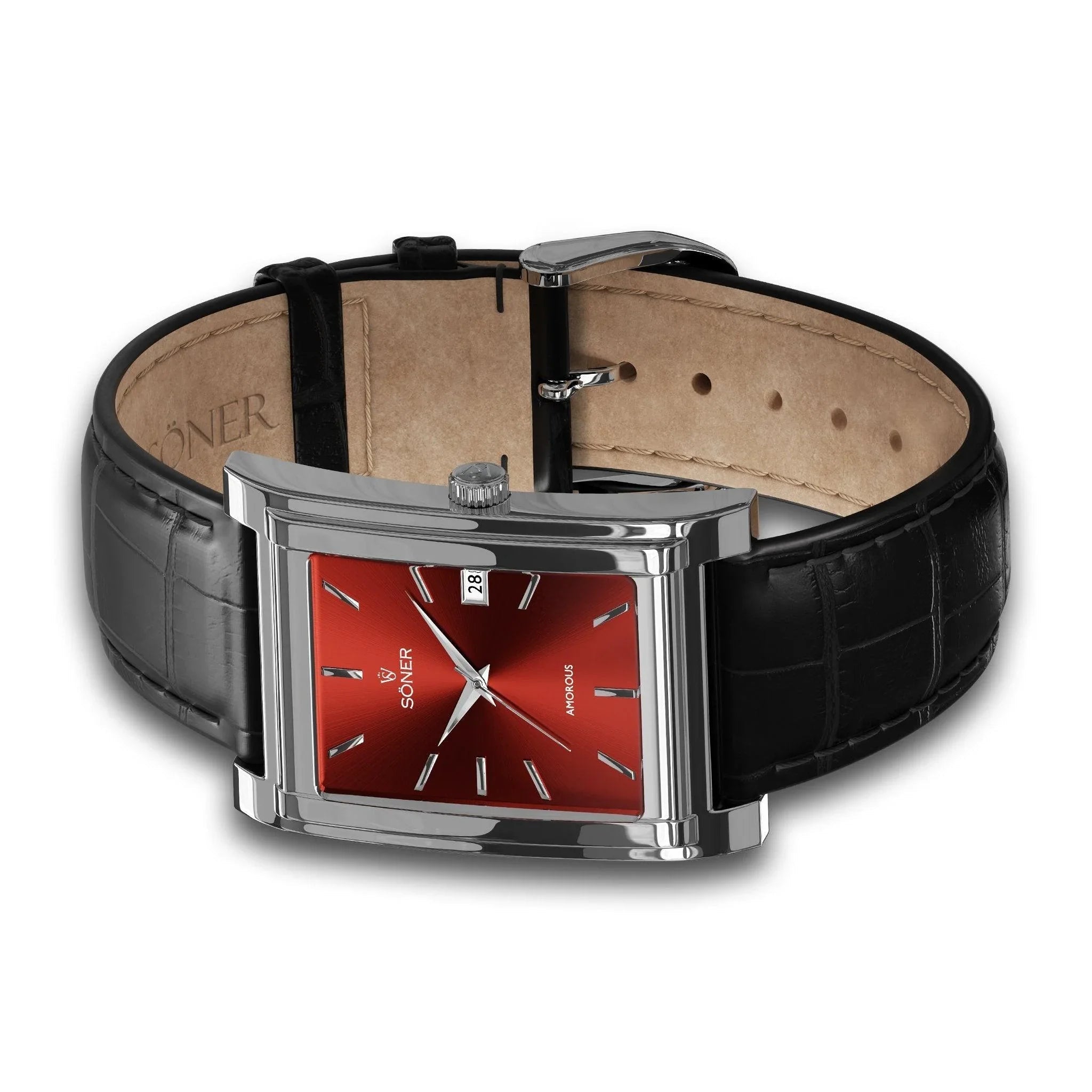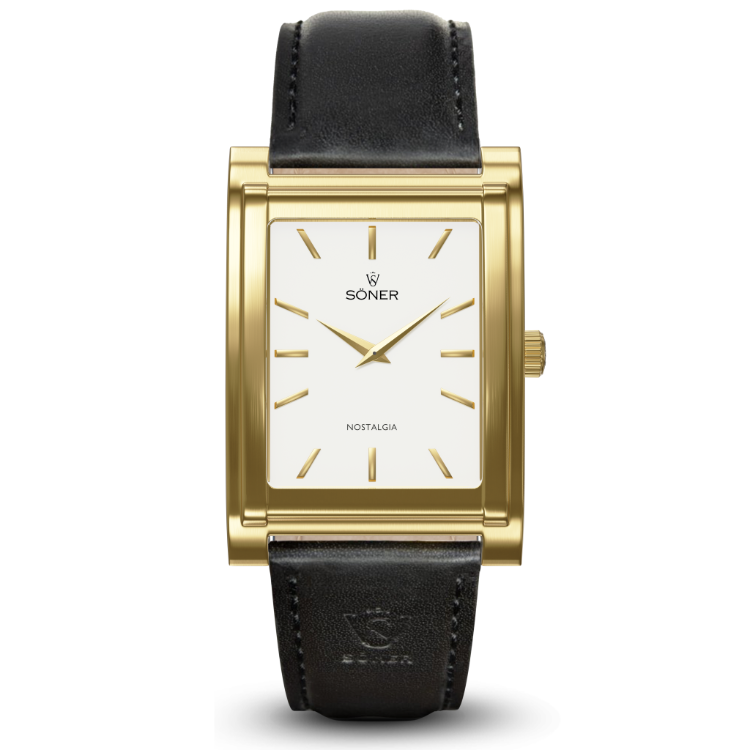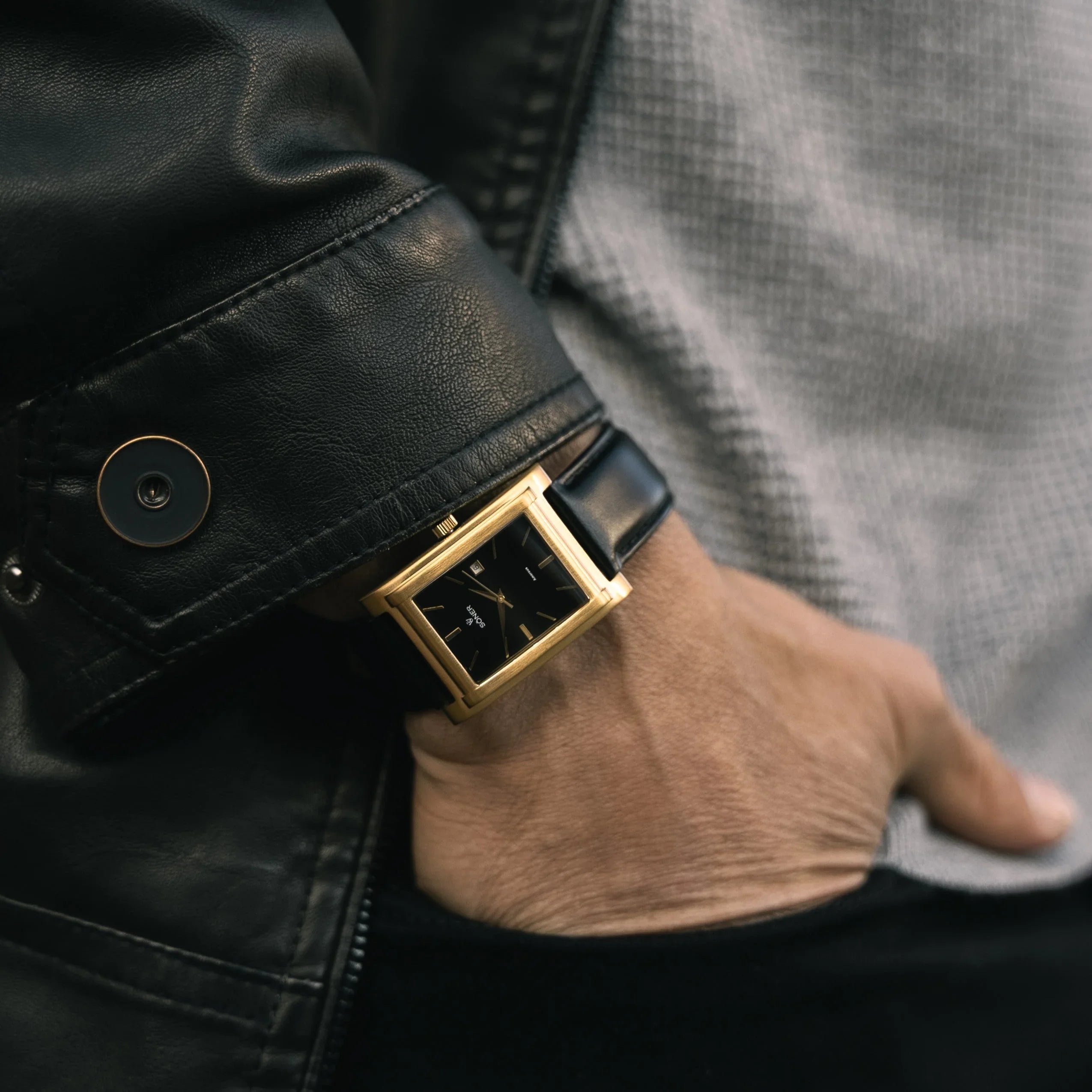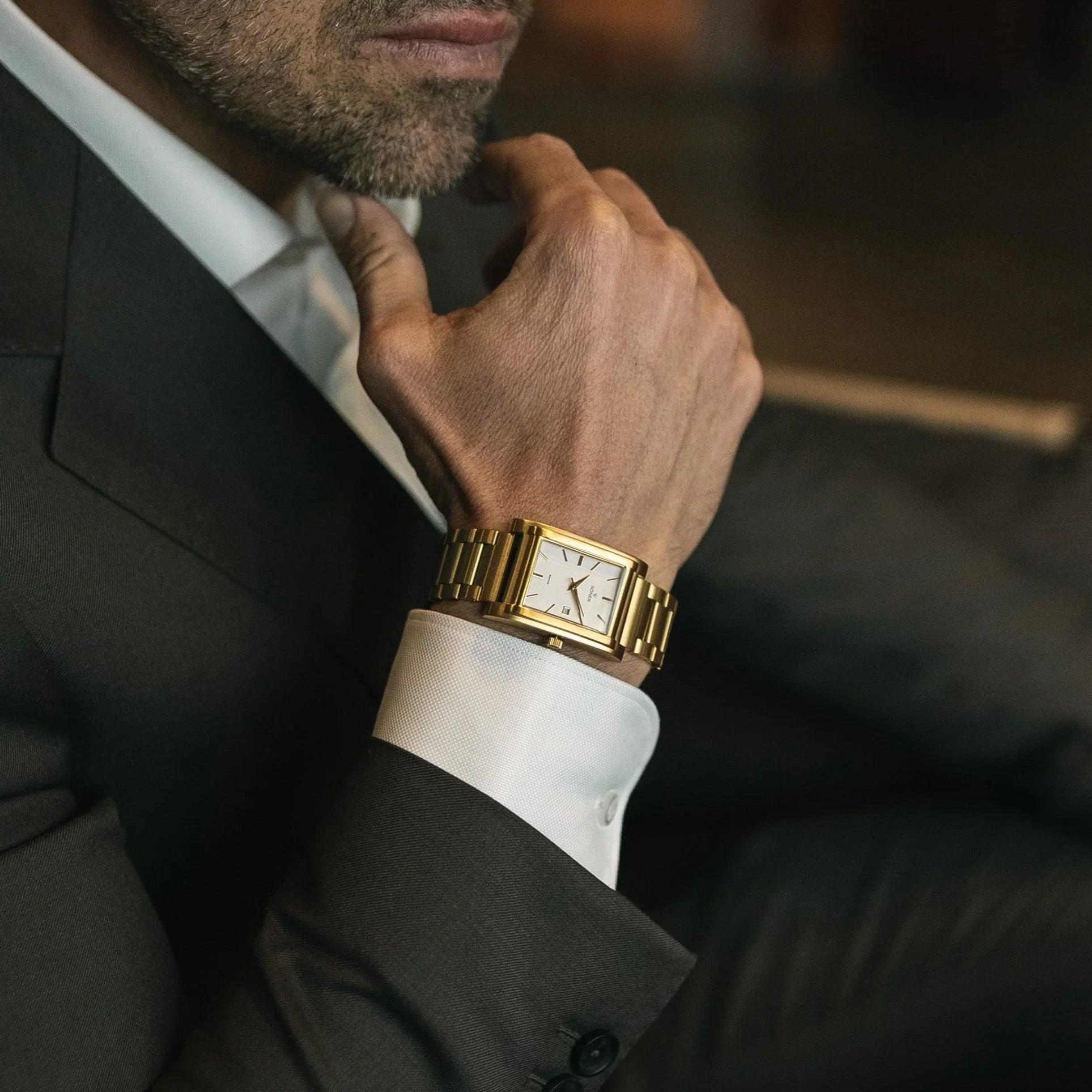Key Takeaways
Table of Contents
Leather Vs Metal Watch Band
Leather and metal straps solve different problems elegantly. Leather straps are organic, tactile and luxurious, conforming to the wrist and appearing dressier out of the box. Metal bracelets made of stainless steel, titanium, or precious alloys, communicate solidity and endurance. They shrug off rain and sweat, don’t soak odors and feel appropriate on sport, field and tool watches while also scaling up dressier watches with polished or patterned links.
Before choosing between leather and metal watch bands, make sure you weigh them out on the design and aesthetics scale. Here is a summary of their strengths and setbacks:
- Leather: These watch bands are classic, warm and versatile across colors and textures. A smooth black or brown calfskin signals business formality.
- Metal: These bands are sleek, durable, and built for everyday wear. Brushed finishes suit casual looks, while polished links elevate semi-formal outfits.

Are Metal Or Leather Watch Bands Better?
“Better” is contextual. Leather wins when discretion, lightness, and classic style are top priorities. Metal wins when longevity, moisture resistance, and adaptability matter most. Consider this framing:
- Choose leather if: You spend most days in meetings or client-facing roles, wear tailoring often, or prioritize comfort under close-fitting cuffs. You appreciate patina and want the option to shift colors seasonally without changing the watch.
- Choose metal if: Your routine includes commuting, travel, gym sessions, school runs, or unpredictable weather. You prefer one strap that can handle sweat, sudden rain, and active movement with minimal upkeep.
- There is a tie-breaker: If you’re genuinely split, choose metal first for durability, then add one premium leather strap for suits, dinners, and special occasions.
Remember that the band is a system choice with clasp ergonomics, micro-adjust range, link articulation, and end-link fit all affecting “better” as much as the raw material.
Torn between leather and metal?
Answer a few lifestyle questions to get a strap pick based on climate, comfort, and maintenance.
Take the strap fit quizHow Do You Choose Between Leather And Metal Watch Bands?
Whether you are an everyday user or just a watch enthusiast, choosing the right band depends on how you prioritize comfort, durability, and occasion. Once those are clear, secondary factors like budget, maintenance, skin sensitivity, and wardrobe coordination help fine-tune your choice.
Primary Filters:
| Priority | Guidance |
|---|---|
| Comfort | choose leather’s soft, lightweight feel or metal’s secure adjustable fit with added heft. |
| Durability | leather performs well mostly indoors and with minimal moisture exposure, while metal stands up to the elements. |
| Occasion | leather leans more towards the classic look while metal offers versatility across the board. |
| Priority | Guidance |
|---|---|
| Budget | A single metal bracelet can last a decade, while leather straps may need replacing over time. |
| Maintenance | Leather requires conditioning; metal needs only a quick wipe. |
| Skin Sensitivity | If you're sensitive to nickel, opt for 316L steel, titanium, or PVD-coated metals. Some leathers also feature hypoallergenic linings. |
| Wardrobe Synergy | Leather pairs well with shoes and belts. Metal acts as a neutral accent, like jewelry. |
With Rectangular watches, you don’t have to choose just one. Each timepiece is designed to accommodate both premium leather and metal straps, giving you the freedom to switch styles without switching watches. Whether you're dressing for a boardroom or a weekend getaway, adapt to your life and your look. Explore our collection and build a rotation that reflects your climate, calendar, and character while staying true to comfort and durability.
What Lifestyle And Comfort Factors Should You Consider?
Also consider how your daily rhythm affects watch strap comfort more than any technical specification. If your lifestyle involves commuting, physical activity, or frequent outdoor exposure, metal straps handle friction and moisture better. Leather, on the other hand, benefits from rest days to stay supple and fresh. In hot or humid climates, leather absorbs sweat and may darken or develop odor, while metal remains stable but can feel warm against the skin. Cold weather favors leather for its softer touch, though metal warms quickly after initial contact. For sensitive skin, hypoallergenic leather linings and breathable rally-style designs reduce irritation, while high-grade metals like 316L steel or titanium minimize reactions.
Fit and movement matter just as much. A strap that’s too loose can rotate and chafe, while one that’s too tight traps heat and leaves marks. Leather offers fixed sizing, while metal allows micro-adjustments for daily comfort. Metal suits variable or sweaty environments while leather fits style-focused, climate-controlled routines.

What Style, Price, And Maintenance Aspects Matter Most?
Choosing a watch strap is not just about looks but about how style, cost, and care fit into your daily life.
- Style: Leather straps are a classic pick for suits, meetings, dinners, and formal events. Colors send different signals: black feels powerful, brown feels warm, and navy or burgundy add quiet style. Smooth or textured finishes and stitching details can change the overall vibe. Metal straps on the other hand are more modern and flexible. Brushed steel looks rugged, polished links feel dressy, mesh styles look sleek, and integrated bracelets feel high-end and stylish.
- Price: Leather usually costs less upfront but may need replacing every 1 to 3 years, especially in hot weather. Exotic leathers cost more and still wear out faster than metal. Metal straps cost more at first but last much longer. You might need to fix a clasp or link now and then, but not replace the whole strap.
- Care: Leather needs wiping after sweat, occasional conditioning, and should be kept dry. Take it off before swimming. Metal can be rinsed after salt or chlorine exposure, cleaned with soap, and lightly polished. Avoid strong chemicals.
- Trends: Formal jobs often prefer leather. Tech and creative fields lean toward metal or mixed styles. Leather works better in cooler climates. Metal suits tropical weather. Collectors usually own both, using leather for style and metal for everyday use.
Sensitive skin or hot weather?
See hypoallergenic metals, breathable strap designs, and adjustments that keep wrists calm in humidity.
Find skin-friendly optionsWhat Are The Advantages Of Leather Watch Bands?
If you're leaning toward leather, consider the comfort and style advantages that make it a favorite for refined, everyday wear.
- Softer feel: Immediately wrist-friendly; conforms to shape, reducing hot spots
- Lightweight: Ideal for long office days and travel where you want to “forget” the strap
- Formal polish: Read as refined with suits, dress shirts, knitwear, and eveningwear
- Color and texture range: From stealth black to rich cognac, from smooth calf to exotic grains; rapid style changes via quick-release pins
- Quiet wear: No clatter and is discreet under sleeves
- Patina potential: Quality leather develops character over time
- Seasonal styling: Swap quickly to reflect wardrobe or event (winter darks, summer lights)
What Are The Disadvantages Of Leather Watch Bands?
While leather offers elegance and comfort, it also comes with a few limitations worth considering before making it your everyday choice.
- Moisture vulnerability: Sweat, rain, and sunscreen degrade fibers, darken color, and can cause odor without rotation and care
- Shorter lifespan: Even well cared for, expect replacement every few years, so long-term cost adds up
- Maintenance load: Needs conditioning, avoid soaking
- Climate constraints: Humidity accelerates wear; hot skin plus friction equals faster breakdown
- Sensitivity concerns: Some dyes and tannins can irritate; hypoallergenic linings help but don’t work for everyone
- Stretch and deformation: Over time holes widen and edges curl, affecting fit and appearance

What Are The Advantages Of Metal Watch Bands?
If durability and versatility are high on your list, metal watch bands offer a strong set of benefits for both active and everyday wear. Here are some advantages of metal watch bands:
- High durability: Resists moisture, abrasion, and daily knocks; ideal for hard-use environments
- Longevity: With basic care, a good bracelet can outlast the watch’s first service cycle by years
- Easy upkeep: Wipe, rinse, occasional mild soap; no conditioning routines
- All-weather readiness: Heat, humidity, and sudden rain pose no structural issues
- Micro-adjust comfort: On-the-fly clasp adjustments keep fit perfect as wrists swell or shrink
- Style range: From brushed steel to high-polish dress bracelets and finely woven mesh, metal spans casual to semi-formal easily
- Security: Solid clasps, secure end links, and screw pins (on quality bracelets) inspire confidence during active movement
Want your strap to last longer?
Follow a simple care routine and replacement timeline for leather versus metal bracelets.
Get care and lifespan tipsWhat Are The Disadvantages Of Metal Watch Bands?
While metal bands offer durability and versatility, they come with a few drawbacks that may affect comfort, fit, and long-term wear.
- Weight: Some find the heft fatiguing on smaller wrists or with very large cases
- Temperature feel: Can feel hot in sun or cold in winter until it equilibrates
- Fit complexity: Requires link sizing and fine adjustments for best comfort; poor fit causes rotation or pinch
- Cuff clearance: Bulky clasps or tall links can snag tighter sleeves; selecting slim clasps helps
- Skin reactions: Cheap alloys can irritate; choose 316L, titanium, or coated options if sensitive
- Scratch visibility: Polished surfaces show hairlines; brushing or Cape Cod cloths can help, but it’s ongoing
Is It Better To Have A Leather Or Metal Watch For Everyday Use?
“Everyday” use typically includes work, errands, commuting, casual outings, and social events. The best strap is the one that stays comfortable and looks appropriate across all these settings with minimal effort.
Leather works well if your routine is mostly indoors, climate-controlled, and style-focused. It offers a soft feel, quiet wear, and pairs easily with office attire. Rotating straps helps extend their lifespan and keeps your look fresh.
Metal is a better fit for active, unpredictable days. If you're moving between buildings, dealing with weather changes, or squeezing in workouts, metal handles sweat, moisture, and impact with ease. It also offers flexible sizing for changing wrist conditions.
For maximum versatility, consider watches with interchangeable bands. Use metal for high-activity days and leather for formal or relaxed settings. If you had to choose just one for a busy urban lifestyle, metal is often more practical. A single premium leather strap can then elevate your look when needed.
What Should You Know About Leather And Metal Band Durability?
Durability isn’t just about how long a strap lasts. It also includes how well it ages and how much care it needs to stay looking good over time.
Leather durability insights
- Lifespan: Typically lasts 1 to 3 years in hot or humid conditions, and 3 to 5 years in milder climates with proper rotation and care
- Common issues: Cracking around buckle holes, fraying edges, delaminated linings, and odor buildup
- Care tips: Rotate straps to allow drying, wipe down after sweaty days, avoid soaking, condition occasionally, and store away from direct heat
Metal durability insights
- Lifespan: Can last 10 to 30 years with basic cleaning and occasional servicing such as spring bar or clasp maintenance
- Common issues: Link stretch over time, visible scratches on polished surfaces, and loose screws if left unchecked
- Care tips: Rinse after exposure to salt or chlorine, clean periodically with a toothbrush or ultrasonic cleaner, inspect screws and pins during service, and replace worn springs when needed
General tips for both types
- Fit matters: Poorly fitted straps wear out faster and feel less comfortable
- Watch out for chemicals: Sunscreen, fragrances, and harsh cleaners can accelerate wear, so wipe down after exposure
- Seasonal rotation: Treat straps like shoes by rotating them to let materials rest and recover
Choose the strap type that matches the pace and demands of your daily routine.
When Should You Wear A Watch With A Metal Band?
Metal watch bands are ideal when your day involves unpredictable conditions, frequent movement, or a mix of casual and active settings.
- Travel days: Airport security trays, changing climates, and long walks are no problem for a metal bracelet
- Hot or humid climates: Sweat and sudden showers won’t affect the band, though you should still check your watch’s water resistance
- Casual to smart-casual outfits: Brushed steel pairs well with denim and tees, while polished links transition easily to dinner settings
- Outdoor events and errands: Whether you're at a market or a stadium, metal offers easy cleaning and strong durability
- Hybrid wardrobes: If your day moves from school drop-off to meetings and evening plans, a well-finished bracelet fits every setting
- Interchangeable setups: Keep a leather strap on hand and switch it in when your schedule calls for something more formal
Semi-formal occasions: A polished or two-tone bracelet works surprisingly well under a sport coat or cocktail dress with metallic accents.






















